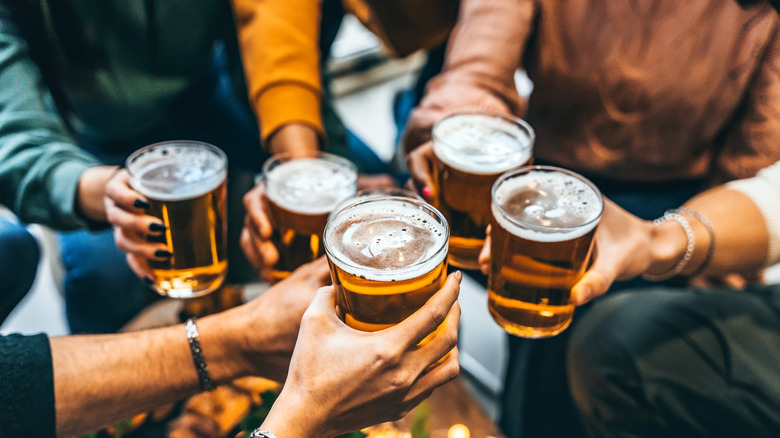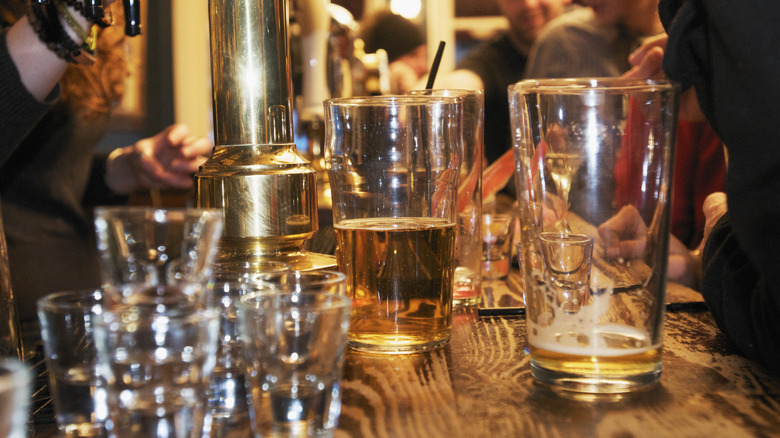Drinking Alcohol Can Increase Your Risk Of 7 Types Of Cancer
U.S. Surgeon General Dr. Vivek Murthy believes the link between alcohol consumption and cancer to be so strong that he has issued an advisory to add a health warning label on alcoholic beverages. Next to tobacco and obesity, alcohol is one of the leading preventable causes of cancer, responsible for more than 96,000 cancer cases in the United States in 2019, according to the 2025 report.
Almost 22% of women who drink two drinks per day have a risk of developing some type of cancer. Men who drink two drinks a day have a slightly lower risk than women, with 13% developing alcohol-related cancer over their lifetime. This risk is based on data from a 2021 article in the British Journal of Cancer which found that alcohol is linked to cancers of the throat, voice box, colorectum, esophagus, liver, mouth, and breast.
However, people who have fewer than two drinks per day aren't necessarily off the hook. A little more than 11% of men and 19% of women who drink one alcoholic beverage a day are likely to develop cancer at some point in their lifetime. Although epidemiological studies like this one cannot prove a causal link, Murthy's advisory points out a few ways alcohol use might cause cancer
Alcohol may cause cancer through multiple mechanisms
When you drink any type of alcohol, your body's enzymes break it down into a toxic substance called acetaldehyde. Acetaldehyde can bind to DNA, interfering with its ability to repair itself and triggering harmful mutations that can lead to tumor formation, according to a 2021 study in Nutrients.
Alcohol use can also lead to oxidative stress, where reactive oxygen species (ROS) harm cells by damaging DNA and interfering with the cells' normal signaling processes. That interference can cause cells to grow out of control and spread through the body.
Chronic stress, lack of exercise, obesity, and sleep problems can lead to inflammation, and inflammation can also lead to cancer. Long-term alcohol use can worsen cancer progression by attracting inflammation-producing immune cells that produce more ROS. Your gut microbiome can be thrown off balance by drinking alcohol, and harmful byproducts are more likely to enter your bloodstream as the lining of your gut becomes more permeable. That, too, leads to more inflammation.
Alcohol is closely linked to breast cancer because of alcohol's role in disrupting estrogen levels. Alcohol also interferes with the regulation and metabolism of other hormones.
Smoking is also linked to cancer. Alcohol can increase your body's ability to absorb the carcinogens from cigarette smoke and other cancer-causing substances in the air, increasing your risk.
Many people are confused about alcohol's health risks
Right now, all alcohol sold in the United States comes with a warning label that states alcohol's effect on a developing fetus and how it can impair your ability to drive. Murthy's advisory urges the U.S. Congress to add the cancer warning to the current label to make more people aware of alcohol's effect on cancer. According to a 2019 survey by the American Institute for Cancer Research, just 45% of people are aware of the risk of cancer due to alcohol consumption. (Here are some of the other effects of alcohol on the body.)
In a 2020 comment in The Lancet, the researchers describe how alcohol as a cancer risk factor is often ignored, partially due to the alcohol industry's public relations efforts to downplay the health research. The alcohol industry also influences health policy by funding global health initiatives.
Current U.S. guidelines state that people should drink in moderation if they choose to drink. Moderate drinking is considered to be two drinks for men and one drink for women. However, that doesn't necessarily mean that moderate drinking is safe, even though it was considered healthy in the past, according to a 2022 report from the World Health Organization. Instead, the WHO says it's looking for valid research that determines a "safe" amount of alcohol that doesn't increase the risk of cancer. (Read what happens to your body when you stop drinking alcohol.)


